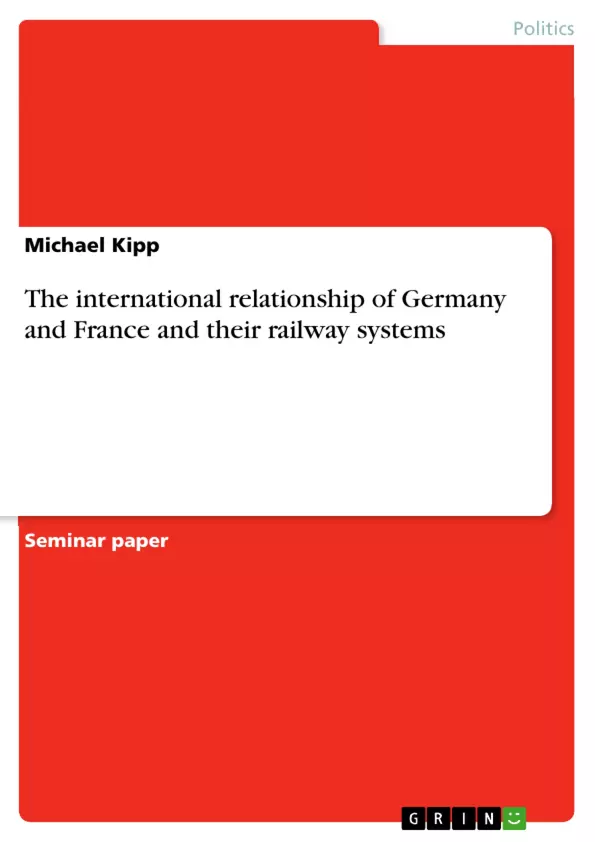The purpose of this study is to examine the Franco-German relationship
putting a strong focus on the two different railroad systems. The first two
chapters will analyze Germany’s and France’s railroad systems from their
early starts until the beginning of the First World War in a compressed way.
In the following step, the fourth chapter, both systems will be compared and
contrasted to each other. It’s intended to show similarities and differences. A
railway network can in general be regarded as a mirror of its national
economy. A sustainable growth in a country’s economy can hardly fail to
benefit its railroads. In the 19th century Germany’s railroads benefitted from a
boosting economy whereas the French economy did not take into the same
direction. This had remarkable effects on the commerce via rail and the
French railroad network in total.1
This study will not compare the years after 1914 when the railways where
primarily used to lead to the front. Each country’s economy and its inner
political movements had comparatively minor effects in contrast to the
military strategies and decisions.
A major challenge will be undoubtedly to fit all the necessary complexity into
a single format. Therefore all comparisons shall be divided into three different
aspects. At first the administrations of France and Germany shall be put
opposite to each other starting with the railroads early years until the
beginning of the 20th century. Additionally the two countries’ economies and
their effects on the railroad construction will be analyzed. At last the military
strategies will be examined, for example during the Franco-Prussian War and
the remaining pre-war times.
In the 5th chapter current railroad issues of the two countries will be regarded.
Mutual interests, alliances, but also rivalries and conflicts are a constant part
in the history of two railroad networks, even to this day. They both share
mixed railroad systems combining private, public and economic interests.
The ultimate 6th chapter will summarize the obtained results.
Inhaltsverzeichnis (Table of Contents)
- Introduction
- The German Railroad System
- The French Railroad System
- Comparisons
- Administrative Organization
- Economic Competition
- Military Strategy
- Current French-German Railway issues
- Summary
Zielsetzung und Themenschwerpunkte (Objectives and Key Themes)
This study examines the historical relationship between Germany and France, with a particular focus on their respective railway systems from the early stages of development until the beginning of World War I. The study analyzes the development of both railway systems, highlighting similarities and differences in their organization, economic influence, and military strategic roles.
- Comparison of German and French railway system development
- Analysis of administrative organization and its impact on railway expansion
- Economic competition between Germany and France and its influence on their railway networks
- Military strategic implications of the railway systems in both countries
- Current French-German railway issues and ongoing interactions
Zusammenfassung der Kapitel (Chapter Summaries)
The first chapter introduces the study's objective, which is to examine the Franco-German relationship through the lens of their railway systems. It emphasizes the significance of railways as a reflection of a nation's economic growth and outlines the scope of the study.
The second chapter delves into the development of the German railway system from its early beginnings to the start of World War I. It highlights the role of individual states, the impact of competition, and the eventual transition towards nationalization under the German Empire.
The third chapter similarly explores the evolution of the French railway system, focusing on its unique development in a more centralized setting.
The fourth chapter compares and contrasts the German and French railway systems in terms of their administrative organization, economic competition, and military strategy, showcasing how each system reflected its respective national context.
Schlüsselwörter (Keywords)
The primary focus of this study is on the historical development of the German and French railway systems, examining their organization, economic influences, and military significance. Key themes include the role of state and private interests in railway construction, economic competition between the two countries, and the military strategic importance of rail networks in the late 19th and early 20th centuries.
Frequently Asked Questions
How did the German and French railway systems differ in the 19th century?
The German system benefited from a booming economy and fragmented state structure, while the French system was more centralized but faced different economic challenges.
What role did railways play in military strategy?
Railways were crucial for troop mobilization, as seen during the Franco-Prussian War, where they became a decisive factor in military planning.
Is a railway network a mirror of a national economy?
Yes, the study argues that sustainable economic growth directly benefits and shapes the expansion and efficiency of a country's rail network.
What are the current Franco-German railway issues?
Today's issues involve mutual interests, alliances, and competition in high-speed rail and international logistics.
Why does the study end at 1914?
After 1914, military decisions dominated railway use so heavily that economic and political factors became secondary during World War I.
- Quote paper
- Michael Kipp (Author), 2010, The international relationship of Germany and France and their railway systems, Munich, GRIN Verlag, https://www.grin.com/document/195425



